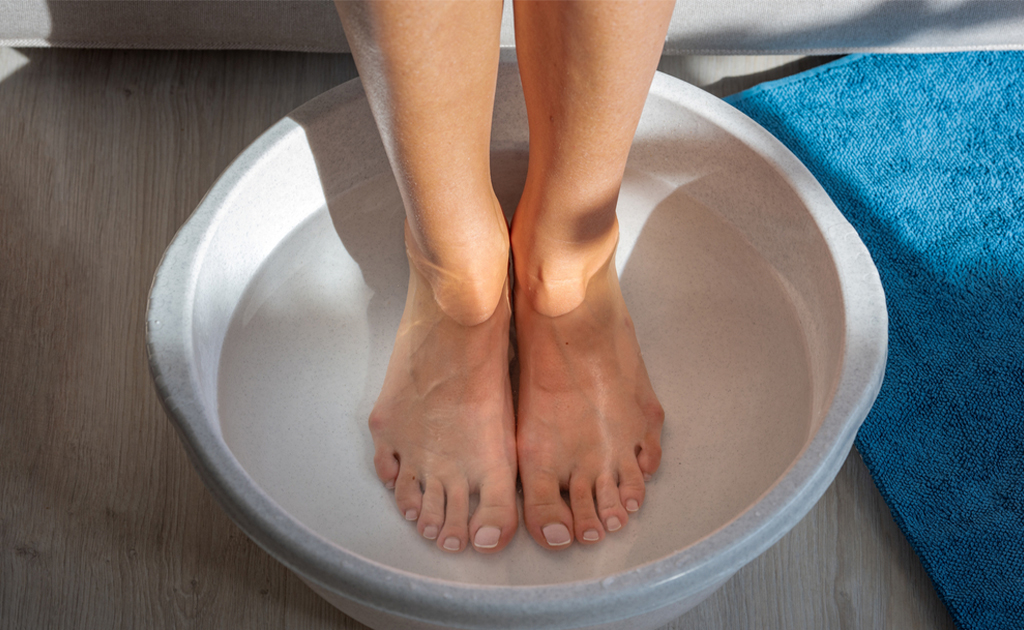How should a diabetic patient's feet be cared for?

Anis Ahmed bought a new pair of shoes. He had blisters on his feet since the first day he wore them to work. He thought they would heal in a few days. But even after a few days, the blisters did not dry out, but rather the sores grew bigger. After thinking about it, he went to the doctor and found out that his problem was a complication of diabetes. Diabetic patients need to be especially aware of foot care. Otherwise, the problem may worsen.
Diabetes is a long-term disease that causes uncontrolled blood glucose levels and affects various parts of the body. The harmful effects of diabetes are particularly visible on the feet. Long-term diabetes damages the nerves and blood vessels in the feet, which can lead to loss of sensation in the feet, circulation problems, and infections. Therefore, it is very important for diabetic patients to take care of their feet.
Why is it important to take care of diabetic patients' feet?
Diabetes damages the nerves and blood vessels in the feet. This causes the nerves in the feet to lose sensitivity. This condition is known as neuropathy. Due to neuropathy, the patient often cannot feel an injury or wound in the feet. Due to this, even minor injuries can become serious. Moreover, if blood circulation is obstructed due to diabetes, wounds in the feet do not dry easily, which increases the risk of infection or ulcers . If not taken care of in time, the infection can turn into gangrene and the foot may have to be amputated through surgery. Therefore, it is very important to take special care of the feet of diabetic patients to avoid such complications.
Risk of negligence
Diabetic patients can suffer from various complications if they do not take proper care of their feet. Some of these complications are:
1. Neuropathy: Long-term diabetes damages the nerves in the feet, reducing the sensitivity of the feet. As a result, many times even if there is an injury, it is not felt. Due to this neglect, the wound can quickly become infected and become serious.
2. Circulatory problems: Diabetes affects the blood vessels in the feet, which restricts blood flow. This slows down the healing of foot wounds and increases the risk of infection.
3. Infections and Ulcers: Even a small blister or wound can be dangerous for diabetics. If a wound or blister on the foot is neglected, it can quickly become infected and turn into an ulcer, which can later become serious.
4. Gangrene: If a wound or infection in the foot is left untreated, it can develop into gangrene. Gangrene is a serious condition that causes the blood supply to the foot to stop and the tissues in the foot to die. In some cases, amputation may be necessary.
How to take care of your feet

There are some rules that should be followed to take care of your feet . Some notable rules are:
1. Regular foot check-ups: The soles of the feet, toes, and other parts of the feet should be thoroughly examined daily. If you notice any sores, blisters, cracks, or redness, you should seek medical advice immediately.
2. Keep clean: Wash your feet with warm water and soap every day. Dry your feet thoroughly and apply moisturizer. However, be careful not to get lotion or cream between your toes.
3. Use the right shoes: Comfortable, properly sized, and flat shoes should be worn. Shoes that are too loose or too tight increase the risk of foot injuries. It is best to avoid shoes with heels or open toes.
4. Toenail Care: It is important to keep your toenails trimmed and clean. You should be very careful while cutting your nails so that you don't get hurt. Generally, nails should be cut in a square shape rather than a U shape. This will avoid the risk of cutting the muscle attached to the corner of the nail.
5. Increase blood circulation: To keep the blood circulation in the legs normal, do light exercises and practice wiggling your toes. If necessary, you should know what kind of exercises to do as per the advice of a physiotherapist. Care should be taken that the patient does not sit with his legs crossed. This hinders blood circulation.
6. Avoid smoking: Smoking impairs blood circulation and increases foot complications in diabetic patients. So avoid smoking.
Warning

1. Never ignore a foot wound or injury.
2. Do not warm your feet with hot water or an electric heating pad. Since diabetes causes reduced sensitivity in the feet, you may not be able to feel the difference in temperature. This can lead to a risk of burning your feet.
3. Before putting on shoes or socks, check carefully to make sure that nothing is poking your feet.
4. If you have any foot problems, do not take medication on your own, but seek medical advice.
Taking proper care of diabetic feet is an important part of their healthy lifestyle. By taking proper foot care and precautions, diabetic patients can protect themselves from many serious complications and maintain good health in the long run. Therefore, each of us should be more aware of the proper care of diabetic feet.
Written by - Mahmuda Akhter Rosy
Physiotherapy Consultant and Gerontologist
Photo - Shutterstock








